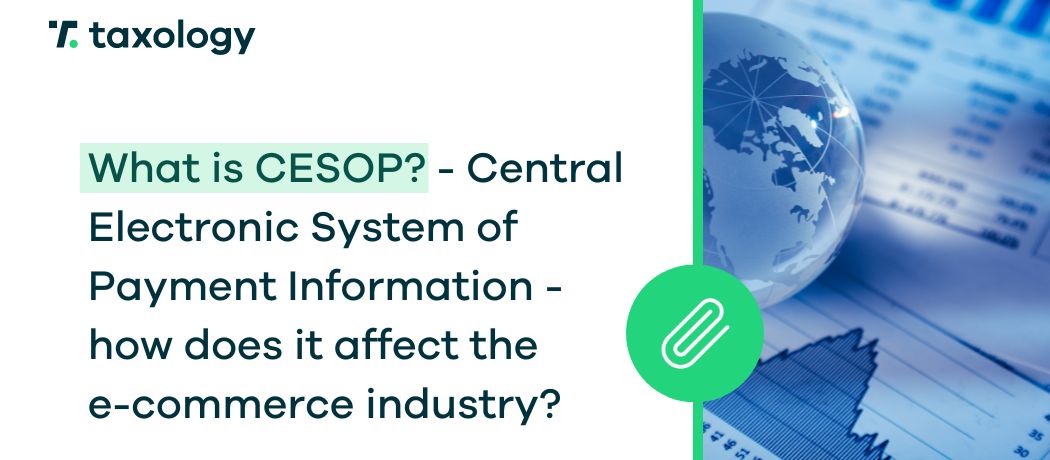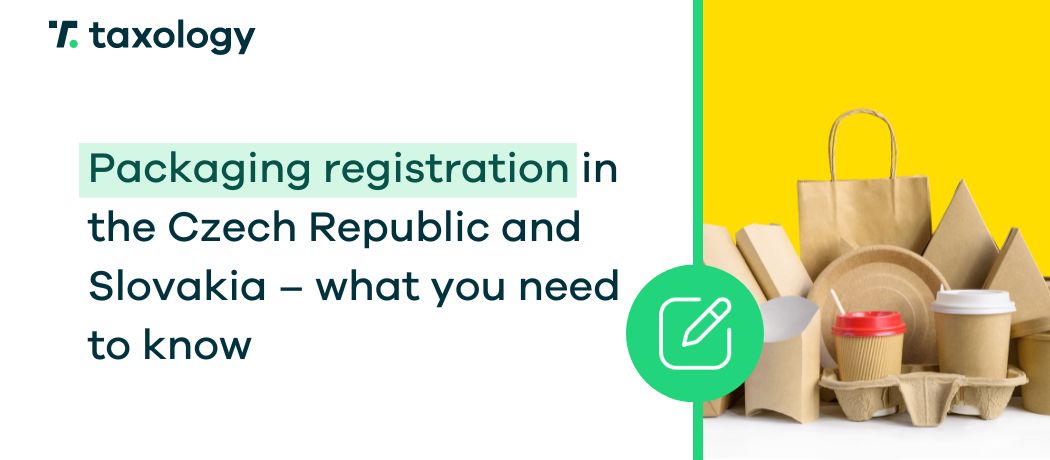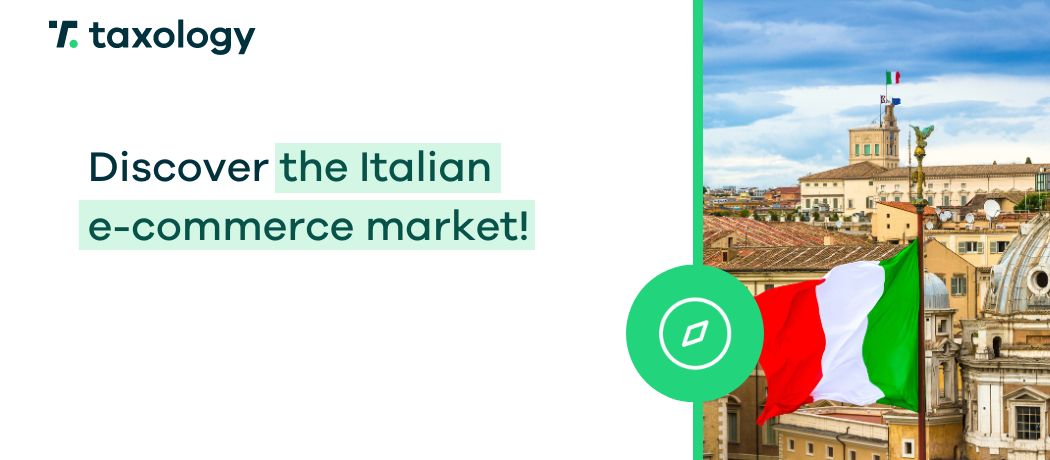France is one of the largest and wealthiest countries in Europe, making it an extremely attractive market for expansion for many entrepreneurs in the e-commerce sector. However, like any other […]
Read in: 5 minWhat is CESOP – Central Electronic System of Payment Information – and how does it affect the e-commerce industry?
- Last update: 23.02.2024
- Published: 05.02.2024
- Read in: 6 min
The e-commerce industry is growing year by year, as confirmed by increasing numbers and the introduction of new technologies and conveniences. This applies to both the quality of services provided by sellers and customer satisfaction. Therefore, it’s no surprise that with modernizations, regulations and rules are also evolving, including the CESOP regulation, or more precisely, the obligations resulting from the implementation of CESOP, which stands for the Central Electronic System of Payment Information, which we focus on in the following article.
From this article, you will learn:
- What is CESOP?
- What obligations are related to CESOP?
- What are the CESOP reporting rules?
- Who exactly is subject to CESOP?
- What penalties are there for lack or late reporting of CESOP?
What is CESOP?
CESOP, or the Central Electronic System of Payment Information, is a system for information on participants in international payment transactions, aimed at combating VAT fraud and countering VAT system gaps, especially in the cross-border e-commerce sector.
CESOP at the European Union level is managed by the European Commission. In Poland, CESOP obligations have been in force since January 1, 2024.
CESOP's new obligation of sharing records of payment recipients and cross-border payments for payment service providers
According to the act of April 14, 2023, payment service providers have an obligation, from the beginning of the current year, to keep records of cross-border payment recipients and share them.
CESOP – recorded data
In the process of keeping records of payment recipients, a payment service provider is obliged to collect the following data:
- name or corporate name of the recipient;
- BIC or another identification code, allowing unambiguous identification of the payment service provider;
- tax identification number with which the recipient identifies themselves for tax purposes (if available);
- IBAN or another identifier, identifying the payment recipient and their location;
- identification number allowing the identification of the recipient who receives funds without having a payment account;
- address of the recipient, if available.
Moreover, for the purpose of record-keeping, providers also collect data concerning payment transactions, which include:
- date and time of payment or refund;
- amount and currency of payment or refund;
- EU state of origin of the payment received by the recipient (or someone on their behalf) or EU state of destination of the refund, as well as information on the origin, destination, or refund of payment;
- other information than the above that allows unambiguous identification of the payment;
- information about the physical presence of the payer when the payment takes place at the merchant’s point of sale.
It is added that regulations stipulate that payment service providers are obliged to keep records for 3 years from the end of the tax year in which the recorded payment occurred.
CESOP reporting rules
In addition to keeping records, payment service providers are also obliged to share collected data with the appropriate authority in the respective member state. The CESOP reporting itself is conducted according to specific rules.
To whom to report CESOP?
If Poland is the country where the payment service provider has its headquarters or main place of business, or if Poland is the host member state, then the authority will be the Head of the National Revenue Administration. Subsequently, data from the national level will be further passed on to the European headquarters.
What is the CESOP reporting period?
Payment service providers are obliged to submit CESOP reports for each quarter of the calendar year, within the last day of the month following the quarter. Meanwhile, the transfer of data from the national level to the headquarters can take place no later than the 10th day of the second month following the reporting quarter.
How to report CESOP?
CESOP reporting is done electronically, through the interfaces of the Standard Audit File services, in the form of a structured XML file.

Need help with VAT or e-commerce accounting?
No problem! Contact us and our specialists will deal with your case. Whether it’s about settlements, registrations, VAT and VAT OSS declarations, or maybe accounting in e-commerce.
Schedule a consultationWho exactly does CESOP obligations concern?
As mentioned earlier, the new obligations related to the Central Electronic System of Payment Information will rest on payment service providers. However, it is worth specifying exactly who is involved, which includes:
- payment service providers if the recipient is in the European Union, in a member state;
- payment service provider of the payer, in the case of an extra-Union payment, i.e., neither of the payment service providers of the recipient is in a member state.
The CESOP obligation arises when:
- payments are cross-border payments – funds are transferred from a payer in a member state to a recipient in the EU, EEA, or beyond these areas;
- a payment service provider, within one quarter of the calendar year, executes more than 25 payments in a given member state, to the same recipient.
According to these guidelines, CESOP obligations will cover: national banks, branches of foreign banks, credit institutions, electronic money institutions and branches of electronic money institutions, payment institutions, cooperative savings and credit unions or National Cooperative Savings and Credit Unions, branches of entities providing postal payment services in another member state according to the law of that state, authorized according to the law of that state to provide payment services, as well as Polish Post Joint Stock Company to the extent that separate provisions authorize it to provide payment services.
CESOP obligations and penalties
Failure to meet CESOP obligations, e.g., by not delivering reports on time or at all, is treated as a fiscal offense and can result in a fine. The amount of the fine can range from 10% to 2000% of the minimum wage.
CESOP and the e-commerce industry
In the case of the e-commerce industry, the CESOP register is an essential tool for controlling the correctness of VAT settlements. Thanks to CESOP reports, tax authorities will be able to easily verify whether sellers comply with paying VAT in various EU countries (e.g., under the VAT OSS procedure or by submitting local tax declarations). Currently, it is still common for companies to tax VAT transactions in Poland despite exceeding the threshold of 10,000 EUR in retail sales to other EU countries. With the introduction of CESOP, they must reckon with a much higher risk of control by tax authorities from other countries.
What is CESOP? - summary
The introduction of the Central Electronic System of Payment Information (CESOP) is a significant step towards increasing financial transparency and combating tax fraud, especially in the e-commerce sector. CESOP serves as a tool to patch gaps in the European VAT system and is supervised by the European Commission, but the main obligations arising from it concern payment service providers.
In Poland, from January 1, 2024, they are obliged to record information concerning payment recipients and payment transactions and share this data with the Head of the National Revenue Administration, who then forwards it to the European headquarters. The period for which providers must submit CESOP reports is the calendar year quarter, and they have time to share information until the last day of the month following the quarter. Meanwhile, delay or failure to meet this obligation is treated as a fiscal offense and can threaten with a fine ranging from 1/10 to 20 times the minimum wage.
CESOP will undoubtedly help combat tax fraud in the e-commerce industry, particularly in terms of VAT. If you need support in this area, our team of VAT Compliance specialists can help you! Whether it’s about registrations, settlements, or VAT and VAT OSS declarations in EU or UK countries. If you need help, schedule a consultation and tell us where the problem lies.




